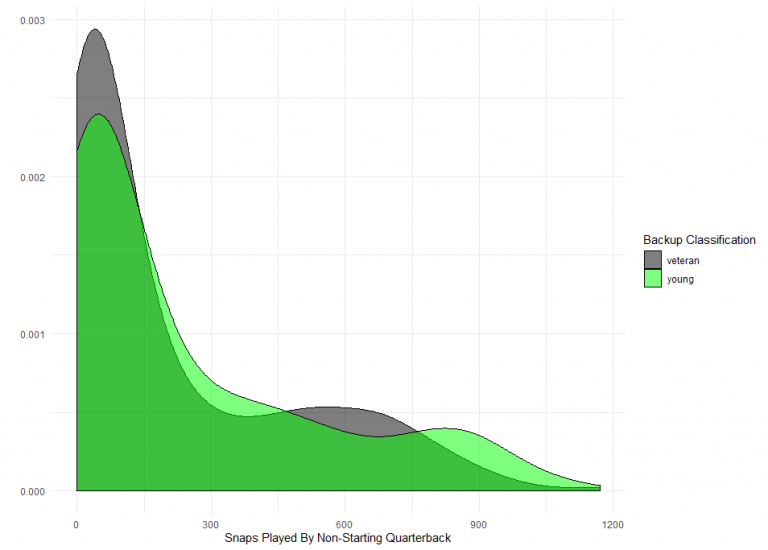Post by Purple Pain on Oct 30, 2019 19:41:19 GMT -6
NFL Teams Are Undervaluing Backup QBs, Even in the Era of the Backup QB by Rodger Sherman
More at link:
www.theringer.com/nfl/2019/10/25/20931065/backup-quarterback-value-teddy-bridgewater-matt-moore
Related, from r/nfl:
Sometimes it can seem like NFL backup quarterback is the world’s best job. Take the career of Bears backup Chase Daniel, who has earned $34 million over 10 years in the league—and started only five games, throwing a grand total of 214 passes. He’s earned $160,301 per pass attempt, and, well, those passes haven’t even been particularly good. Daniel is joined by heroes such as Drew Stanton ($32 million, 17 career starts) and Mike Glennon ($29 million, 22 career starts) in the NFL’s Work Smart Not Hard club for career backup quarterbacks who’ve made more than $1 million per start.
And to be fair, backup quarterback is a job completely unlike other jobs—even in the NFL. Backup running backs get frequent playing time, often being deployed as third-down or goal-line specialists. Backup wide receivers enter a game after a starter runs a few consecutive deep routes. Backup tight ends, linemen, linebackers, and defensive backs all rotate in with regularity, either because a starter needs a break or because a given formation calls for it. But there are no third-down quarterbacks, goal-line quarterbacks, or slot quarterbacks. There are a starter and a backup, and ideally the starting quarterback takes 100 percent of the offensive snaps. (Sadly, with the exception of the Saints’ Taysom Hill packages, NFL teams don’t seem interested in two-quarterback formations.) Quarterback is the most important position in football, and teams won’t dilute their quality of play by giving snaps to their second-string option.
Unfortunately, life is not a dream world where backups sit on the sideline, daydreaming and doodling on their clipboards. While teams rarely play their backup QBs voluntarily, more teams than not deal with injuries at the quarterback position. Through the first seven weeks of this season, six starting quarterbacks have already missed games with injuries. Two teams have seen the backup quarterback who’d been replacing their injured starter get hurt. There have been 107 games thus far, and therefore 214 possible quarterback starts. By my count, teams have been without their preferred starter due to injury for 23 of them, or 10.7 percent. And these figures don’t account for the situation involving reigning league MVP Patrick Mahomes, who suffered a knee injury last week while trying to play through an ankle injury in his other leg. The Washington Post called this “The Year of the Backup QB,” CBS Sports called it Backup QB Takeover 2019, and SB Nation wrote that “we’re running out of starting quarterbacks.”
Looking back at the past few seasons, though, it’s clear that this year’s QB injury situation isn’t unusual. In 2018, 16 NFL quarterbacks played in all 16 games, meaning that another 16 missed at least one game for some reason or another. And that was the season with the fewest adjusted games lost at QB in the league since 2012. In 2017, only 12 starting quarterbacks played in 16 games. A Football Outsiders look at QB injuries after the 2016 season estimated that NFL quarterbacks were missing about 84 starts per season—about 16 percent of the league’s total. In this season filled with injuries, we’re actually behind pace.
And in recent years, it has become increasingly clear that a team’s season can depend on whether it has a competent backup quarterback. The most obvious example is the 2017 Eagles, who won the Super Bowl despite an injury to Carson Wentz because backup Nick Foles put forth one of the best playoff runs in football history. This year, future Hall of Famer/GOAT candidate Drew Brees has been out since Week 2 with a thumb injury—and Teddy Bridgewater, the highest-paid backup in the league, has stepped in and executed, going 5-0 in five starts while throwing nine touchdowns and just two interceptions. Thanks to Bridgewater’s efforts, New Orleans remains in position to get a first-round postseason bye and perhaps even home-field advantage in the NFC. And the Colts had to turn to their backup after Andrew Luck abruptly retired in late August; they were bailed out by Jacoby Brissett, who has Indianapolis sitting at 4-2 and in first place in its division.
Of course, there are also examples of teams capsizing because of their backup QBs. Washington was 6-3 when Alex Smith broke his leg last November; behind Josh Johnson, Colt McCoy, and Mark Sanchez, it dropped six of its final seven games despite three of its final five coming against sub-.500 opponents. In 2017, the Texans got off to a promising start with rookie Deshaun Watson; after Watson tore his ACL in a November practice, Houston went 1-8 with backups Tom Savage and T.J. Yates leading the way. The 2017 Packers were above .500 with Aaron Rodgers in the lineup, but 3-6 once Brett Hundley was forced into starting duty. And Derek Carr led the 2016 Raiders to a 12-3 record while throwing 28 touchdowns and six interceptions; after he got hurt Week 16, the team headed into the playoffs starting rookie QB Connor Cook, who went 18-of-45 passing with three interceptions in a loss to Houston. Cook hasn’t played in the NFL since.
For all the jokes about backup QBs being bench-riding multimillionaires, I’d argue that they’re actually undervalued. Any team with playoff hopes has to ensure that those dreams won’t be shattered by an individual player’s problems. If quarterback is the most important position in the sport, then finding a quality backup is more crucial than most teams seem to realize.
And to be fair, backup quarterback is a job completely unlike other jobs—even in the NFL. Backup running backs get frequent playing time, often being deployed as third-down or goal-line specialists. Backup wide receivers enter a game after a starter runs a few consecutive deep routes. Backup tight ends, linemen, linebackers, and defensive backs all rotate in with regularity, either because a starter needs a break or because a given formation calls for it. But there are no third-down quarterbacks, goal-line quarterbacks, or slot quarterbacks. There are a starter and a backup, and ideally the starting quarterback takes 100 percent of the offensive snaps. (Sadly, with the exception of the Saints’ Taysom Hill packages, NFL teams don’t seem interested in two-quarterback formations.) Quarterback is the most important position in football, and teams won’t dilute their quality of play by giving snaps to their second-string option.
Unfortunately, life is not a dream world where backups sit on the sideline, daydreaming and doodling on their clipboards. While teams rarely play their backup QBs voluntarily, more teams than not deal with injuries at the quarterback position. Through the first seven weeks of this season, six starting quarterbacks have already missed games with injuries. Two teams have seen the backup quarterback who’d been replacing their injured starter get hurt. There have been 107 games thus far, and therefore 214 possible quarterback starts. By my count, teams have been without their preferred starter due to injury for 23 of them, or 10.7 percent. And these figures don’t account for the situation involving reigning league MVP Patrick Mahomes, who suffered a knee injury last week while trying to play through an ankle injury in his other leg. The Washington Post called this “The Year of the Backup QB,” CBS Sports called it Backup QB Takeover 2019, and SB Nation wrote that “we’re running out of starting quarterbacks.”
Looking back at the past few seasons, though, it’s clear that this year’s QB injury situation isn’t unusual. In 2018, 16 NFL quarterbacks played in all 16 games, meaning that another 16 missed at least one game for some reason or another. And that was the season with the fewest adjusted games lost at QB in the league since 2012. In 2017, only 12 starting quarterbacks played in 16 games. A Football Outsiders look at QB injuries after the 2016 season estimated that NFL quarterbacks were missing about 84 starts per season—about 16 percent of the league’s total. In this season filled with injuries, we’re actually behind pace.
And in recent years, it has become increasingly clear that a team’s season can depend on whether it has a competent backup quarterback. The most obvious example is the 2017 Eagles, who won the Super Bowl despite an injury to Carson Wentz because backup Nick Foles put forth one of the best playoff runs in football history. This year, future Hall of Famer/GOAT candidate Drew Brees has been out since Week 2 with a thumb injury—and Teddy Bridgewater, the highest-paid backup in the league, has stepped in and executed, going 5-0 in five starts while throwing nine touchdowns and just two interceptions. Thanks to Bridgewater’s efforts, New Orleans remains in position to get a first-round postseason bye and perhaps even home-field advantage in the NFC. And the Colts had to turn to their backup after Andrew Luck abruptly retired in late August; they were bailed out by Jacoby Brissett, who has Indianapolis sitting at 4-2 and in first place in its division.
Of course, there are also examples of teams capsizing because of their backup QBs. Washington was 6-3 when Alex Smith broke his leg last November; behind Josh Johnson, Colt McCoy, and Mark Sanchez, it dropped six of its final seven games despite three of its final five coming against sub-.500 opponents. In 2017, the Texans got off to a promising start with rookie Deshaun Watson; after Watson tore his ACL in a November practice, Houston went 1-8 with backups Tom Savage and T.J. Yates leading the way. The 2017 Packers were above .500 with Aaron Rodgers in the lineup, but 3-6 once Brett Hundley was forced into starting duty. And Derek Carr led the 2016 Raiders to a 12-3 record while throwing 28 touchdowns and six interceptions; after he got hurt Week 16, the team headed into the playoffs starting rookie QB Connor Cook, who went 18-of-45 passing with three interceptions in a loss to Houston. Cook hasn’t played in the NFL since.
For all the jokes about backup QBs being bench-riding multimillionaires, I’d argue that they’re actually undervalued. Any team with playoff hopes has to ensure that those dreams won’t be shattered by an individual player’s problems. If quarterback is the most important position in the sport, then finding a quality backup is more crucial than most teams seem to realize.
More at link:
www.theringer.com/nfl/2019/10/25/20931065/backup-quarterback-value-teddy-bridgewater-matt-moore
Related, from r/nfl:
The fact that Patrick Mahomes, Drew Brees, Andrew Luck, and Cam Newton can go down and their backups all look good is a testament to how much fans/media overrate QB's and underrate coaching and infrastucture by Ramy_
I am NOT saying any of these QB's are or were overrated. Obviously Patrick Mahomes is good, obviously Drew Brees is good etc... What I am saying is infrastructure and coaching is actually more important than the QB but we as fans just love the QB and prefer to give them all the credit.
Matt Moore wasn't even the backup in KC. He was out of the league for two years and got called to come in because the Chiefs backup was injured and he looked like a top ten QB.
If Matt Moore started a whole season in KC and Patrick Mahomes started the whole season on this years Dolphins or Jets there would be people saying Matt Moore is a better QB than Mahomes. That's how important coaching and infrastructure is in the league.
I am NOT saying any of these QB's are or were overrated. Obviously Patrick Mahomes is good, obviously Drew Brees is good etc... What I am saying is infrastructure and coaching is actually more important than the QB but we as fans just love the QB and prefer to give them all the credit.
Matt Moore wasn't even the backup in KC. He was out of the league for two years and got called to come in because the Chiefs backup was injured and he looked like a top ten QB.
If Matt Moore started a whole season in KC and Patrick Mahomes started the whole season on this years Dolphins or Jets there would be people saying Matt Moore is a better QB than Mahomes. That's how important coaching and infrastructure is in the league.





















 ... and neither is this Chris guy.
... and neither is this Chris guy.